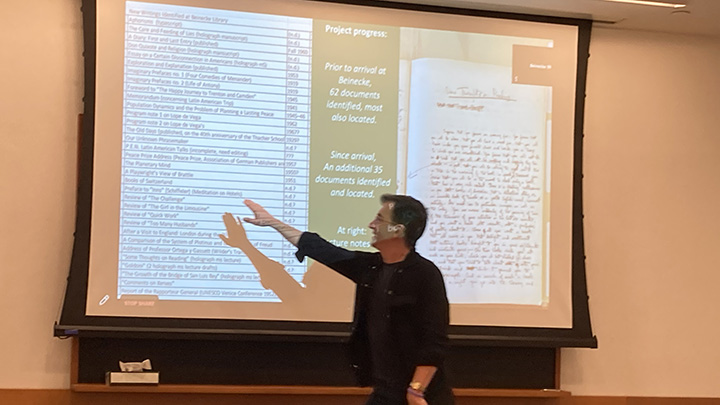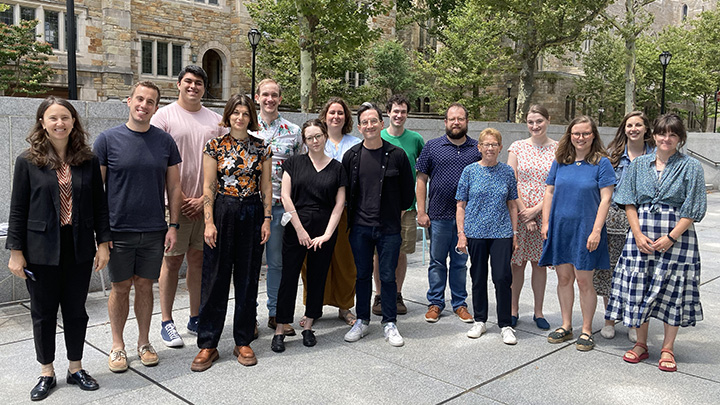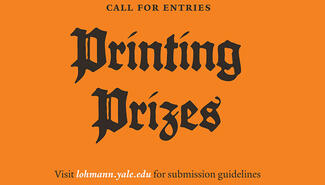Mormons, music, theater, and celebrity: Library Fellows explore the archives
Six visiting scholars, recipients of Beinecke Library Research Fellowships, recently gave riveting presentations about their research in the Beinecke Library’s Manuscripts and Archives Collection. The six scholars are among fifty fellows that the library has welcomed back this year after a hiatus in the program, due both to a planned restructuring of the program and the university’s COVID restrictions for visitors. Applications are now being accepted for 2023–24 fellowships.
Victoria Papa, assistant professor of English and visual culture at Massachusetts College of Liberal Arts, is working with the papers of the poet H. D. (Hilda Doolittle). H.D. is among the modernist literary figures featured in Papa’s forthcoming book, Aesthetics of Survival. As Papa explained, H. D. drew on challenging personal experiences—as a bisexual, a woman, and an avant-garde poet—to expand the representation of trauma in literature. Papa is exploring H. D.’s interest in psychoanalysis (the poet was for a short time a patient of Sigmund Freud) and also in the occult. Papa found in the archives illustrated astrology notebooks containing the natal charts of H. D.’s friends. She also discovered letters between the poet and her lover, Silvia Dobson, an amateur astrology. Dobson drew the charts, and H. D. interpreted their signs and symbols—a type of analysis Papa described as similar to a “close literary reading.”
T. Ashton Reynolds, a PhD candidate in history from Southern Methodist University, is tracking the different sects of Mormonism that spun off after the murder of Joseph Smith. Smith, who was killed in 1844, was the charismatic leader and founder of the Church of Jesus Christ of Latter-day Saints. Reynolds is conducting much of his research this summer in the James Jesse Strang collection. Strang believed Smith had designated him as successor and founded a new sect known as the Strangites. He renounced the practice of polygamy and declared himself “king of the Kingdom of God.” When Strang changed his stance and took a second wife, however, his followers rebelled. Reynolds’s research also led him to the papers of Mary Louisa Sanger, one of Strang’s early and avid followers, who also became disillusioned. Reynolds discovered that Sanger—one of the few women’s voices in the Strang correspondence—was particularly bold in expressing her dismay at Strang’s inability to live up to her expectations of what a prophet should be.
Stephen Spinelli, director of choral programs, Boston Conservatory, is also the co-founder of ONEcomposer, an initiative committed to “telling the stories of neglected musical voices.” Not a believer in “the trope of the ‘lost’ manuscript,” Spinelli has unearthed—and arranged for new performances of—the compositions of Margaret Bonds. Pianist, composer, and teacher, Bonds was the first African American woman to solo with a symphony orchestra, which she did in Chicago in 1933. She was also a frequent collaborator with Langston Hughes, setting the writer’s words to music. Bonds’s manuscript drafts and arrangements for solo voice and chorus are in the Beinecke’s collection. Hughes’s papers are also at the Beinecke, as are the papers of the also recently rediscovered Florence B. Price. Bonds studied piano and composition with Price, the first African American woman recognized as an important American composer. She was also the first to have her work performed by a major orchestra. In 2013, the Chicago Symphony Orchestra presented Price’s 1934 composition Mississippi River Suite. There is a “whole world of music that is not taught,” said Spinelli, who is working to change that through the educational efforts of his organization.
The research of Henriëtte Rietveld, a DFA candidate at Yale School of Drama, centers on seventeenth-century theater in the early modern Dutch republic. She is exploring in particular its relationship to Dutch colonialism and the “myths of peaceful imperialism.” Reitveld discovered four early volumes in the Beinecke’s collection—and related images, atlases, and maps—that will provide her focus. She has identified three significant themes in Dutch imperialist narratives: mercantilism (as related to theatrical production), the ambivalent relationship of the Dutch to the sea, and the colonial sense of superiority. Rietveld will study these narratives in multiple editions, tracing the variations in scripts and performances through time. She will also track changing depictions of recurrent characters, such as Peeckelhaering, a stock figure in 17th-century comic plays. She will also examine these four volumes as physical objects, analyzing the meanings and uses of ornaments on the printed pages.
Joseph Cermatori, associate professor of English at Skidmore College, is also the author of Baroque Modernity: An Aesthetics of Theater. He conducted his research for that book as a Yale Library Special Collections Fellow in 2008. Working in the Gertrude Stein archives during that fellowship, he discovered the seed for this year’s research project: an unpublished, twenty-five-page, hand-written essay by Thornton Wilder. The topic was baroque theater (“The Barock,” in Wilder’s German spelling of the term). Thornton Wilder, an important figure in American theater, is well known both as a novelist and dramatist. Cermatori transcribed the manuscript and published it in the journal PMLA. Later, the Wilder family approached him with a proposal for a new volume of Wilder’s collected nonfiction. Since arriving at Yale this summer, Cermatori has so far located and digitized thirty-five critical essays by Wilder—including some of Wilder’s unpublished notes about the Spanish playwright Lope de Vega.
Literary critic and biographer Francesca Wade is the author of Square Haunting: Five Writers in London Between the Wars. The book is a group portrait of literary women: the poet H. D., novelist and essayist Virginia Woolf, mystery writer Dorothy L. Sayers, classicist Jane Harrison, and economic historian Eileen Power. Wade researched that book during her first Special Collections fellowship at Yale. This summer she is researching her new book, to be published in 2024. Gertrude Stein: An Afterlife will explore Stein’s posthumous legacy. After the publication of The Autobiography of Alice B. Toklas, Wade explained, Stein’s reputation was more as a personality than a writer of the work she had hoped would attract readers. Stein’s complete papers are, as she had requested, in the Beinecke’s collection, thanks to the efforts of Alice B. Toklas and Thornton Wilder. Stein wanted her papers at Yale explicitly for the purposes of later research. She felt her innovative literary work would be better understood and appreciated by future generations. Wade will be writing about Yale’s role in preserving Stein’s legacy. She will share what she has learned from the correspondence between Toklas and Carl Van Vechten, Stein’s co-executors. Some scenes in the book, she promised, will be set in the Beinecke reading room itself.
—Deborah Cannarella
Image captions:
The research fellows who participated—as speakers or as audience—in the first summer fellowship colloquium (from left to right): Katie Anania, Stephen Spinelli, David Kerry, Victoria Papa, Ian Halter, Sara Green, Henriëtte Rietveld, Joseph Cermatori, Nathaniel Donahue, T. Ashton Reynolds, Vivien Whelpton, Molly Yarn, Francesca Wade, Jane Meditz (library staff), and Ann Marguerite Tartsinis
Joseph Cermatori shares a list of the nonfiction works by Thornton Wilder that he has found to date at the Beinecke Library.
Photos by Deborah Cannarella




